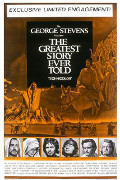
Directed by
George Stevens
260/195 minutes
Rated G
Reviewed by
Bernard Hemingway

The Greatest Story Ever Told
The life of Christ may be a great story but at 4 hours (its original theatrical runtime was 260 mins) it's still too long in the telling.
The film's gorgeously syrupy cinematography (Monument Valley, Utah filled in for The Holy Land) and Stevens's aspiration to epic grandeur is perfectly appropriate to the heavily mythicized life of the saviour of mankind even if from a modern perspective J.C. comes across a self-obsessed bore and the stench of piety is overwhelming.
Based on the best-seller by Fulton Oursler this sort of film, is, of course, very much of its time, one in which Hollywood was battling television with bloated religious epics such as Cecile B. DeMille's The Ten Commandments (1956) and Stanley Kubrick's Spartacus (1960) and church-going was a social requirement for Mr and Mrs Average American.
Shot in Ultra Panavision 70 widescreen with a then-unknown Max von Sydow playing Jesus and a host of name actors including Charlton Heston, John Wayne Sidney Poitier, Martin Landau, Claude Rains, Telly Savalas, Jose Ferrer, Dorothy McGuire and Sal Mineo appearing in more or less inappropriate roles, for all its datedness, The Greatest Story Ever Told, is a solid example of the last throes of this style of crowd-aweing production.
Want something different?





